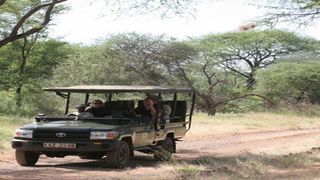
Tourists at the Meru National Park.
| File | Nation Media GroupMeru
Premium
The connection between Meru National Park and bandits
Meru National Park is a shining star in the upper eastern region, having overcome poaching and insecurity associated with the Shifta era in the ’80s and ’90s.
It is in this park that George and Joy Adamson, the subject of the popular movie Born Free, released the wild Elsa, a lioness they had rescued and nursed back to health.
But in the part of the park bordering Tharaka Nithi County, cattle rustlers and bandits are having a field day.
Lacking a fence on that side, the park has become a perfect hideout for criminals, who take advantage of the mostly semi-arid bushland and scrubby grassland.
The criminals, who know the terrain, sneak into villages in the evening and raid homesteads at night, when it’s difficult for security officers to pursue them.
Once they steal livestock, the only hope of recovering them lies with Kenya Wildlife Service rangers, who are sometimes lucky to intercept them before they cross the park.
It’s usually a life-and-death affair for rangers when they confront the armed bandits.
Cattle theft has been a problem for many years and the resulting insecurity is blamed for underdevelopment in the Kamacabi, Kiamiramba, Kioru, Kamutuandu in Kathangacini and Kanjoro locations that border the park.
Almost every family in the area has a story to tell about encounters with bandits, and some have lost their animals and loved ones.
Because the areas receive very little rainfall, not enough to support crop farming, locals rely on livestock as their economic mainstay to educate their children and meet other needs.
The most recent attack was on Wednesday when armed cattle rustlers raided Kamacabi and escaped with over 500 animals into Meru National Park.
The attack came a few weeks after Tharaka Nithi security officials, led by County Commissioner Beverly Opwora, warned residents about a possible attack, urging them to remain vigilant.
Witnesses said over 50 heavily armed men, suspected to have come from neighbouring Garissa County, stormed a watering area near the Ura River and ordered them to surrender their livestock, phones and money.
The bandits also forced the herders to lie down, threatening to shoot anyone who resisted their demands, before they vanished into the vast conservancy.
The criminals wore clothes similar to police jungle uniforms, residents said. They also raided nearby homes, stealing food at gunpoint and driving away animals in broad daylight.
Ms Annjuster Mwithi had just arrived at the river to fetch water with her three donkeys at around 3pm when the criminals struck.
“They forced us to lie down, threatening to shoot anyone who resisted or even stood up before they vanished into Meru National Park. They also took my Sh600 and a phone,” she said.
Mr Mutuura M’Mwathi, another victim, said he lost 72 goats, three cows and two donkeys to the criminals, who had enough time even to eat cooked food from the homes they raided.
He said the bandits made sure hundreds of livestock had arrived to drink from the river before they attacked.
“They must have been hiding in the bush near the river on the side of the park waiting for us to come to water our animals,” he said.
Other residents who lost their livestock include Kaimba Nkiruni, Mutegi Mbea, Kimathi Mutegi and Mucee Kajiu.
An hour after the criminals left, police officers from the Kamacabi, Kamutuandu, Kamacabi and Makutano police posts arrived and with locals pursued them into the park.
Luckily, KWS rangers intercepted the rustlers at around midnight, about 15km inside the park, and recovered some goats, donkeys and cows.
But the bandits escaped with the rest of the livestock into the darkness and could have crossed the park into neighbouring Isiolo County.
KWS regional assistant director Captain Robert O'Brien told the media that there was a heavy exchange of gunfire between the rangers and the bandits but no one was hurt.
“At around midnight, we located some of the bandits and engaged them and managed to recover 128 goats, three donkeys and 14 cows,” Captain O'Brien said.
For the past two years, KWS officers have recovered some of the livestock stolen from villages.
But residents are optimistic that the ongoing building of a 53km electric fence will keep away the bandits and have urged the government to fence the whole park.
The Sh96 million project was launched in September last year by Tourism Cabinet Secretary Najib Balala but progress is slow because of limited funding.
The fence is also expected to minimise human-wildlife conflict that has led to the deaths of people and animals.
The government, through the Tharaka NG-CDF, has built police posts and associated facilities in banditry-prone areas, including Gaceuni, Kamacabi, Makutano, Kamutuandu and Kiamiramba but few officers have been deployed.





